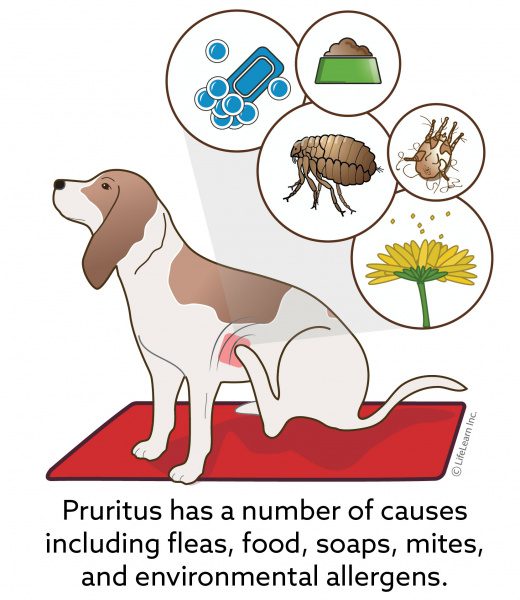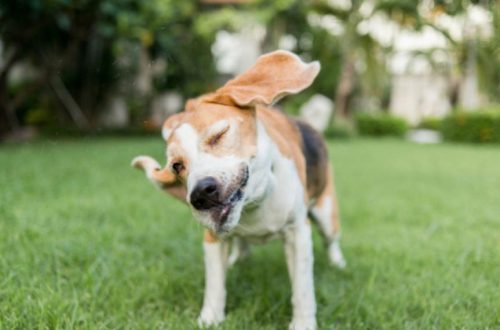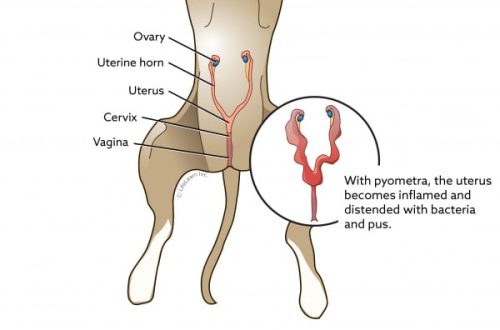
Why is my dog itching?
Your dog is more likely to itch in warmer weather. There are many causes of pruritus in dogs, but each of them requires the elimination of other factors before starting treatment.
Nothing is more frustrating than the feeling that your pet is uncomfortable, so the first thing you need to do is to soothe your pet’s itchy skin. The two main causes of itching in dogs are insects and allergies, and these can be seasonal. Need help diagnosing? Book an appointment with your veterinarian. Even if your dog rarely scratches and chews on himself, you need to make sure that you are doing everything right and using safe means to relieve his discomfort.
Contents
Fleas and ticks
If you notice that your dog is constantly itching, check him for fleas and ticks first. These blood-sucking insects constantly choose dogs as their habitat and can be located anywhere. Ticks may go unnoticed for some time until they are completely engorged with blood and large enough to be detected and removed. Keep in mind that these irritating insects can and do carry a variety of dangerous diseases, so it’s important to inspect your pet during tick season and any time it enters a potentially infested area.
Fleas are less dangerous, but bring the same discomfort. Infestations with these parasites can cause severe itching and skin reactions, sometimes requiring veterinary attention. Some pets can develop allergic reactions to flea bites, causing painful red spots, hair loss, swelling, and even infections. They are sometimes easier to spot than ticks, but with regular inspection of the animal, and if the dog has a long, dark coat, you may need extra help. Comb your pet with a clean flea comb to make sure that the intense itching is caused by fleas. They can be seen on the dog or in places where it most often rests. If you notice that the water has turned a reddish-brown color while bathing your dog, fleas are almost always the culprit.
Examining your pet at home for fleas and ticks is useful not only for herself, but for your entire family. Fleas, in particular, can change hosts and infect your entire home. You don’t want your dog to itch, and neither do you or your family members. Therefore, in turn, after a walk in the fresh air, it is advisable to check yourself and your children for fleas or ticks – to preserve your own health and to avoid transferring parasites to your puppy.
Insect Prevention
The best treatment for fleas and ticks is prevention. Because these pests can be annoying and dangerous, it is recommended that you use flea and tick treatments as often as your veterinarian advises. Preventing the appearance of insects is much easier than trying to remove existing ones. Such measures will ensure the comfort of you and your dog in the future. Be sure to check with your veterinarian to make sure you are using medicated shampoos and preventatives in the correct doses and that they are safe for your pet. There are many different types of insect repellents: topical preparations, flea and tick collars, sprays, and long-acting shampoos. If you find fleas and ticks on your puppy, contact your veterinarian immediately for treatment recommendations. And be sure to treat the animal’s resting places.
alimentary allergy
Just like humans, dogs can suffer from all kinds of allergies. If you haven’t found any fleas or ticks, but your dog continues to itch, an allergy of some kind is likely the cause of the itching. Before starting treatment, consult with your veterinarian to rule out the possibility of an allergy in your pet. Food allergies, however, are one of the rarest types of allergies in dogs.
Looking for the culprit
Food allergies, although rare, do occur, in which case an elimination diet may be needed to find out what ingredients in your dog’s food are allergic to. Together with your veterinarian, you can do an allergy test using new or hydrolyzed protein foods to make sure you are not giving your dog the protein that could be causing the allergy and that he is getting the right nutrition. Feeds sold with a limited number of ingredients sometimes do not pass quality control to avoid cross-contamination of ingredients. Therefore, you and your veterinarian may decide to select antigen-restricted dietary foods that meet your pet’s needs.
Allergy to environmental components
If your dog continues to itch but doesn’t have fleas or food allergies, he may be allergic to environmental ingredients such as pollen or dander. Changing your diet may not bring much relief, but your veterinarian will recommend dietary nutrition to improve your pet’s skin health, as well as suggest the best treatments for environmental allergies.
Depending on the severity of your dog’s itching, treatment can range from mild to complex with more than one method. During periods when there is a deterioration in the condition of the pet, along with the usual care, oral preparations are ideal. If your dog’s itching persists, steroid injections and stronger medications are recommended. Regardless of the cause of the itching, you need to visit a veterinarian before taking control of the situation.
Protect your dog
Eliminating the environmental components that cause allergies is extremely difficult, but not impossible. Since dogs need walks and exercise, keeping them away from pollen is simply unrealistic. A great way to reduce skin irritation in pets is to wipe or wash their paws and stomach after walking. If the dog has been playing outside all day, wash it thoroughly. There are many shampoos, conditioners, and even medicated wipes specifically designed to remove pollen and reduce the irritation it causes. Keep in mind, however, that bathing your dog too often can backfire—your pet will have dry, itchy skin that needs treatment.
Visit a Veterinarian
There are many causes for your dog’s itchy skin, but the most common are insects and allergies. If you notice that your dog is itching, contact your veterinarian, whatever the cause of the itching. Do not give your pet any medication until it has been examined by a veterinarian and received recommendations from him. While treatment may be short-term and simple, you should never make any major decisions that could result in adverse reactions. While fleas and ticks are best treated preventively, food allergies are treated with limited ingredient foods to eliminate the allergic ingredient. Allergies to environmental components are more difficult to treat, but can be managed by following the recommendations of a veterinarian.
To prevent itchy skin in a dog, it is important to wash it at the end of the day and limit contact with external allergens. Even if the condition of the pet has noticeably worsened, there is nothing better than giving him a little bit of your care and seeking help from a veterinarian. Your dog will be back to normal very soon.





